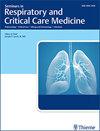Risk of Multidrug-Resistant Pathogens in Severe Community-Acquired Pneumonia
IF 2.3
3区 医学
Q2 CRITICAL CARE MEDICINE
引用次数: 0
Abstract
Severe community-acquired pneumonia (SCAP) is difficult to treat when caused by difficult-to-treat (DTR) pathogens because of limited treatment options and poorer clinical outcomes. Over time, several predictive scoring systems based on risk factors for infection with multidrug resistant pathogens have been developed. We reviewed the available tools for identifying DTR pathogens as the cause of SCAP, both predictive scoring systems and rapid diagnostic methods, to develop management strategies aimed at early identification of DTR pathogens, reducing broad-spectrum antibiotic use and improving clinical outcomes. The scoring systems reviewed show considerable heterogeneity among them at the level of the region studied, the definition of risk factors, as well as which DTR pathogens are the target pathogens. The models described have shown limited effectiveness in reducing inappropriate antibiotic treatment or improving patient outcomes by themselves. However, predictive models could serve as a first step in identifying DTR pathogen infections as part of a larger detection algorithm. Rapid diagnostic tools, such as multiplex polymerase chain reaction, would be useful for the rapid identification of pneumonia-causing pathogens and their resistance mechanisms. In resource-limited settings, rapid tests should be limited to patients at high risk of developing SCAP due to DTR pathogens. We propose an integrative algorithm based on the different scores, taking into account local epidemiological data, where ideally each center should have an antimicrobial stewardship program.严重社区获得性肺炎患者感染耐多药病原体的风险
由难治疗病原体(DTR)引起的重症社区获得性肺炎(SCAP)很难治疗,因为治疗方案有限,临床效果较差。随着时间的推移,基于感染耐多药病原体风险因素的几种预测评分系统已被开发出来。我们回顾了现有的可用于识别引起 SCAP 的耐多药病原体的工具,包括预测评分系统和快速诊断方法,以制定旨在早期识别耐多药病原体、减少广谱抗生素使用和改善临床效果的管理策略。所审查的评分系统在研究地区、风险因素定义以及目标病原体等方面存在很大差异。所描述的模型本身在减少不当抗生素治疗或改善患者预后方面的效果有限。不过,预测模型可以作为识别 DTR 病原体感染的第一步,作为更大检测算法的一部分。快速诊断工具(如多重聚合酶链反应)将有助于快速识别导致肺炎的病原体及其耐药机制。在资源有限的情况下,快速检测应仅限于因 DTR 病原体导致 SCAP 的高风险患者。考虑到当地的流行病学数据,我们提出了一种基于不同评分的综合算法,理想情况下,每个中心都应制定抗菌药物管理计划。
本文章由计算机程序翻译,如有差异,请以英文原文为准。
求助全文
约1分钟内获得全文
求助全文
来源期刊
CiteScore
6.10
自引率
0.00%
发文量
87
审稿时长
6-12 weeks
期刊介绍:
The journal focuses on new diagnostic and therapeutic procedures, laboratory studies, genetic breakthroughs, pathology, clinical features and management as related to such areas as asthma and other lung diseases, critical care management, cystic fibrosis, lung and heart transplantation, pulmonary pathogens, and pleural disease as well as many other related disorders.The journal focuses on new diagnostic and therapeutic procedures, laboratory studies, genetic breakthroughs, pathology, clinical features and management as related to such areas as asthma and other lung diseases, critical care management, cystic fibrosis, lung and heart transplantation, pulmonary pathogens, and pleural disease as well as many other related disorders.

 求助内容:
求助内容: 应助结果提醒方式:
应助结果提醒方式:


